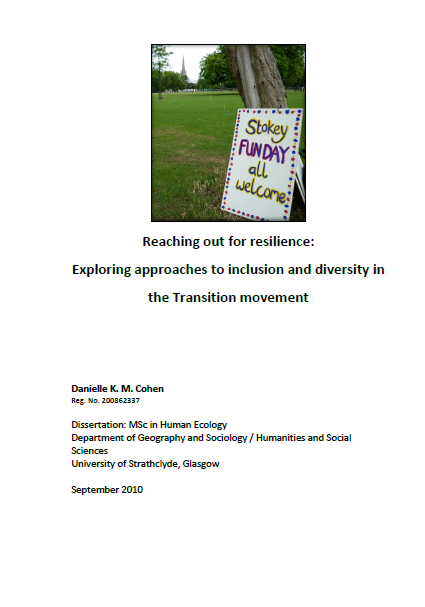1 Nov 2010
New Research Explores Inclusion and Diversity in the Transition Movement
 The number of pieces of quality research being conducted about Transition continues to grow. Here is a new one by Danielle K. M. Cohen at the University of Strathclyde, Glasgow, as part of her dissertation for her MSc in Human Ecology. Entitled “Reaching out for resilience: Exploring approaches to inclusion and diversity in the Transition movement” it is a very useful study about inclusion and diversity. Here’s a sample quote from the conclusion: “people in Transition – in this study at least – often talk about inclusion with a view to bringing different people into the movement. I have argued that this view of inclusion can imply and perpetuate hierarchical power relationships underpinned by assumptions of assimilation and integration. As one co-operative inquiry participant put it, Transition should perhaps not be seeking to include others but should be seeking to be included by them”. You can download the full thesis here: my thanks to Danielle for allowing me to post this.
The number of pieces of quality research being conducted about Transition continues to grow. Here is a new one by Danielle K. M. Cohen at the University of Strathclyde, Glasgow, as part of her dissertation for her MSc in Human Ecology. Entitled “Reaching out for resilience: Exploring approaches to inclusion and diversity in the Transition movement” it is a very useful study about inclusion and diversity. Here’s a sample quote from the conclusion: “people in Transition – in this study at least – often talk about inclusion with a view to bringing different people into the movement. I have argued that this view of inclusion can imply and perpetuate hierarchical power relationships underpinned by assumptions of assimilation and integration. As one co-operative inquiry participant put it, Transition should perhaps not be seeking to include others but should be seeking to be included by them”. You can download the full thesis here: my thanks to Danielle for allowing me to post this.
Mat Redsell
1 Nov 1:20pm
I live offgrid and am completely self sufficient. Windmill, solar cells, composting, gardens, well, composting toilet, I even press my own sunflower seeds and produce biodiesel. The problem is that to do all of this requires a lot of life skills which most people do not have and the maintenance of everything is a fulltime job so working away from the home is impossible. I find that a lot of talk and writing is done by those who do not live a sustainable lifestyle. If this is not what we are transitioning to what is it we are transitioning to?
-mat
Bart Anderson
2 Nov 12:38am
Some very interesting findings.
Could you put me in touch with Danielle, so I could ask permission to post excerpts of it on Energy Bulletin? I think it would bring her work to a wider audience.
As always, we post attribution and a link back to the original.
best wishes,
Bart
Energy Bulletin
treaclemine
3 Nov 9:10pm
My hope is to build a mutually community-reliant web of skilled neighbours, rather than needing to be self-sufficient myself.
Mat Redsell
3 Nov 10:09pm
There needs to be a lot of experimentation as to what really works. I’m already there and now people around me are asking questions. The amount of work that it takes may be very difficult for most people.
And just how one will live sustainably and have a job is beyond me. My prediction is that most of us will haveto learn to live without electricity in a matter of 4- 5 years. Electricity is very costly and the sun is more effective heating things. -mat